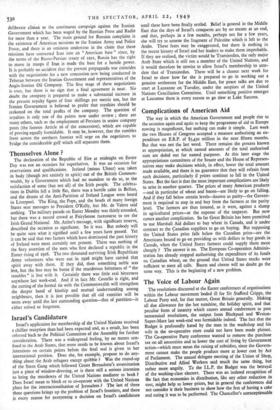Complications of American Aid
The way in which the American Government and people rise to the occasion again and again to keep the programme of aid to Europe moving is magnificent, but nothing can make it simple. Last week the two Houses of Congress accepted a measure authorising an ex- penditure on E.R.P. of $5,430 million in the next fifteen months. But that was not the last word. There remains the process known as appropriation, at which named amounts of the total authorised sum are doled out for named purposes. At this later stage the appropriations committees of the Senate and the House of Represen- tatives may make decisions which, in effect, lower the total amount made available, and there is no guarantee that they will refrain from such decisions, particularly if prices continue to fall in the United States. But the fact is that the most important complications are likely to arise in another quarter. The prices of many American products —and in particular of wheat and bacon—are likely to go on falling. And if they fall below certain levels—known as parity—the Govern- ment is required to step in and buy from the farmers at the parity level. The farmers are thus insured, as it were, against a slump in agricultural prices—at the expense of the taxpayer. But now comes another complication. So far Great Britain has been permitted to use Marshall Aid dollars to buy wheat in Canada, and is under contract to the Canadian suppliers to go on buying. But supposing the United States price falls below the Canadian price—are the Americans bound to go on providing us with dollars to buy goods, in Canada, when the United States farmers could supply them more cheaply ? The answer is no. The European Co-operation Adminis- tration has already stopped authorising the expenditure of its funds on Canadian wheat, on the ground that United States stocks were sufficient to meet all calls. Bacon and cheese will no doubt go the same way. This is the beginning of a new problem.


































 Previous page
Previous page